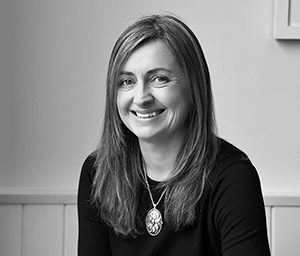As Laura Donnelly takes the lead in Jez Butterworth’s latest play, The Hills of California, she reveals how they inspire one another in life and work, and gives us the low-down on this latest role
Photography by Lee Malone | Styling by Harriet Nicolson | Hair by Sven Bayerbach at Carol Hayes Management using Hair by Sam McKnight | Make up by Justine Jenkins | Shot on location at Hart Shoreditch
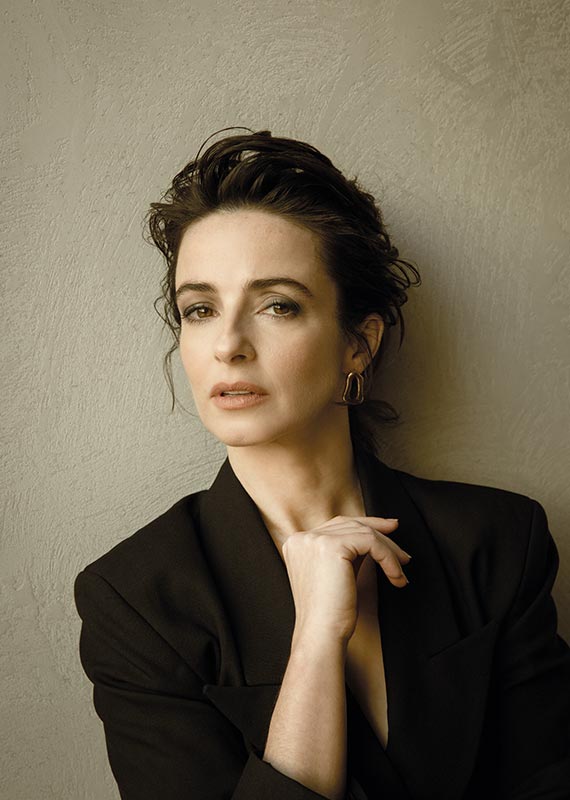 Laura wears: clothing by Laura Pitharas; and jewellery by Alona
Laura wears: clothing by Laura Pitharas; and jewellery by Alona
The Hills of California is set in Blackpool in 1976, the driest summer in 200 years. The beaches are packed, and the hotels are heaving, but in the sweltering backstreets, the Webb sisters are returning to their mother’s run-down guest house as she lies dying upstairs. In his latest production, playwright Jez Butterworth reunites with director Sam Mendes and leading lady Laura Donnelly. It is a stellar combination – the trio last worked together on 2017’s multi-award-winning West End and Broadway hit The Ferryman, which was inspired by the true story of Laura’s uncle’s murder at the hands of the IRA.
This is a very different story, but one that is equally affecting. “It takes place over two time periods,” Laura explains, when we sit down to talk about the production. “We kind of follow the stories of these four sisters, who are returning to the guest house to say goodbye. That’s in the 70s, and in the 50s we see some of their history… I play Veronica, the mother in the 50s part, and also Joan, one of the sisters in the later part. I think Veronica is a woman who is doing her very best to give her kids the greatest life she can possibly give them, and to try and make sure that they go onto something better than the life that she has had… you know, being a single mother and raising these four girls in Blackpool. She wants them to have something much more special than that, and really everything that drives her in the play comes from that.”
A long-term partnership in life as well as work, Jez and Laura first met when she appeared in his 2012 play The River, and the pair now have two young daughters together. I’m intrigued to know if it is hard living and working so closely together. “No, it really isn’t,” Laura assures me. “If working together was difficult, we just wouldn’t do it, because we’re not set on doing it. It is very simply that we just really enjoy it, and we’re very inspired by each other. And it really helps that we have very separate roles in the process: we’re not writing together, we’re not performing together, he’s not directing me.… You know, it’s a very easy separation to make. So outside of each of us doing our own jobs, it doesn’t bleed into our personal lives an awful lot. You’d be surprised how little we discuss it really…”
“From the MOMENT that I FIRST auditioned for The River, I feel like I’ve ALWAYS known how Jez’s writing wants to be DELIVERED, wants to be SAID, and I think that it’s so clear in its SIMPLICITY”
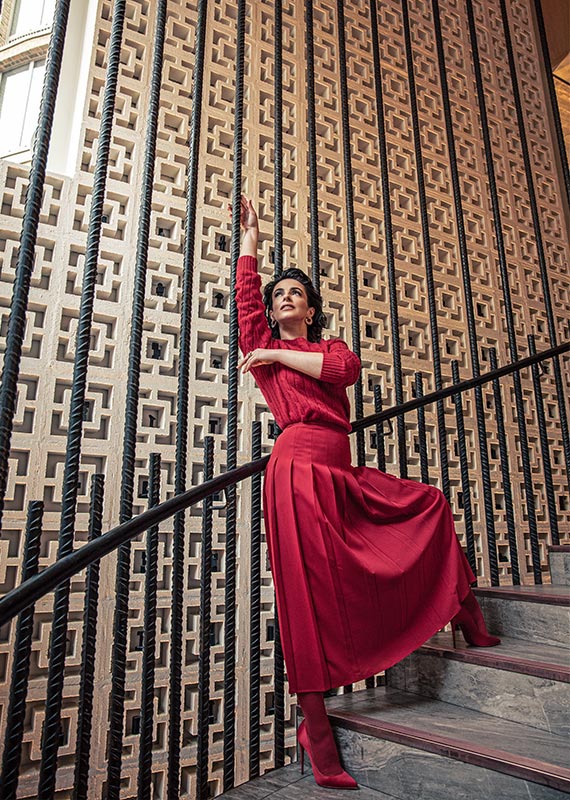 Laura wears: full look by Polo Ralph Lauren; tights by Falke; earrings and ring by David Morris; and shoes by Christian Louboutin
Laura wears: full look by Polo Ralph Lauren; tights by Falke; earrings and ring by David Morris; and shoes by Christian Louboutin
I am certain that one thing they will have discussed is the response to this new play, which premièred in February and is running for a strictly limited season until mid-June. “It’s been received amazingly well,” Laura tells me, happily. “It’s a really fascinating one. When people who I know have seen it, they text or call a day or two later, when they’ve been thinking about it, and they can articulate the effect that it’s had on them. And I love that about it. I think that’s a wonderful thing, that it’s the kind of play that really stays with you. And people seem to kind of take it away and think about how it applies to them and their experience.”
What in particular does Laura hope that people are taking away from watching it? “Well, a friend of mine said something very interesting about it… They said it was a play about how we want to die, and it’s also a play about how we want to live,” she replies, thoughtfully. “I think that it delves so deep into families, and the roles we play within them. And the secrets that we keep within them – the kind of contracts that we make with one another. And how our history in those families shapes our present. And also, how we reshape the history, according to what we need it to be. So, I think that there is so much for people to live with as they take the play away with them, and yeah, I like that. I like that it has seemed to have a very personal connection with so many people. That feels really satisfying. I think that that’s something that plays can do when they’re really working.”
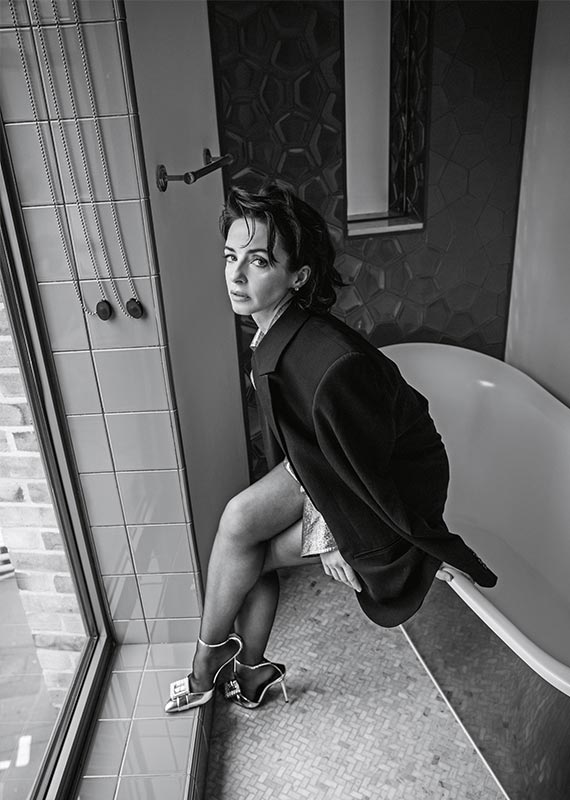 Laura wears: full look by Petar Petrov; tights by Wolford; ring and necklace by Goossens; earrings by Mejuri; and shoes by Giuseppe Zanotti
Laura wears: full look by Petar Petrov; tights by Wolford; ring and necklace by Goossens; earrings by Mejuri; and shoes by Giuseppe Zanotti
Indeed, this is a hallmark of Jez’s work, which has seen him gain a reputation as one of Britain’s most revered modern playwrights. “He has probably been the main inspiration in my life in the last decade or so,” Laura says. “From the moment that I first auditioned for The River, I feel like I’ve always known how Jez’s writing wants to be delivered, wants to be said, and I think that it’s so clear in its simplicity. There’s an ease to working with him, but I think that that’s not so much to do with knowing him, as it is just to do with the quality of the writing. It was the same with doing most of the other really amazing plays that I’ve come across – the better the writing, the easier it is to perform.”
There was one thing that didn’t come easily when it came to this character though, Laura admits. “I had to learn to play the piano for The Hills of California,” she reveals. “It was the scariest element of doing this production by far. But it was quite good because it gave me something to focus my fear on, and therefore I wasn’t concentrating too much on the massive challenge of the character that I had to develop. Instead, all my focus was going on getting a few black and white notes right. So, yeah it was scary, but it’s very fulfilling when you start out with something, and you have absolutely no idea how you’re going to be able to do it, and then by the end you’re doing it quite easily and not having to think about it. I love that – it’s a very satisfying part of the job.”
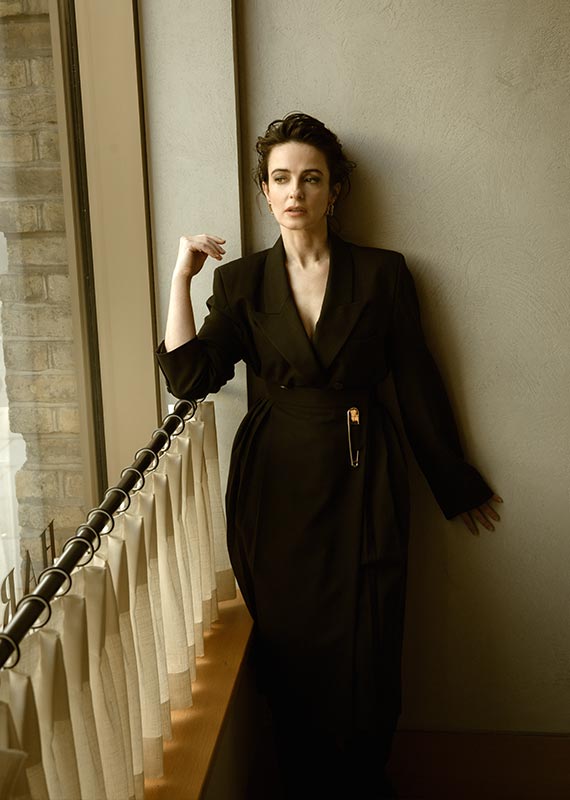 Laura wears: full look by Laura Pitharas; and jewellery by Alona
Laura wears: full look by Laura Pitharas; and jewellery by Alona
What else does she love about the job that she does? “I don’t really know, and you know I kind of mull over that lots,” she admits. “It’s one of those things… you know, why are you in love with somebody? You can list their traits, but it’s not that, it’s just something that is deep within you. It’s pure instinct that has always driven me to it and I could point to things that I enjoy about it, but I don’t think that it would quite cover what is just an instinct. I need to do it.”
This need to perform began at a very young age. “I did some Irish dancing when I was younger, and my teacher would put on amateur productions of what she termed Irish ballets, and they were a kind of stylistic mixture of Irish dancing and ballet through which she would tell the old stories, or myths and legends of Ireland,” Laura tells me. “So, when I was eight or nine years old, I was getting to go on stage a few nights a week, like maybe once or twice a year, and be part of these productions. And it gave me an immediate love for being in a theatre, for being on the stage, for being backstage in the theatre. And the whole world of preparing for a production and getting it ready for opening was what I really, really fell in love with. And I don’t remember how I made the conscious decision to act as opposed to perform in any other capacity, but I just remember very early on, from that point I had decided I was going to be an actress, and so that was that.” After school, she turned down a place to read law and history at Edinburgh University and went on to study at The Royal Conservatoire of Scotland, graduating from there in 2004.
“I think that it delves so deep into FAMILIES, and the ROLES we play within them. And the SECRETS that we keep within them – the kind of CONTRACTS that we make with one another”
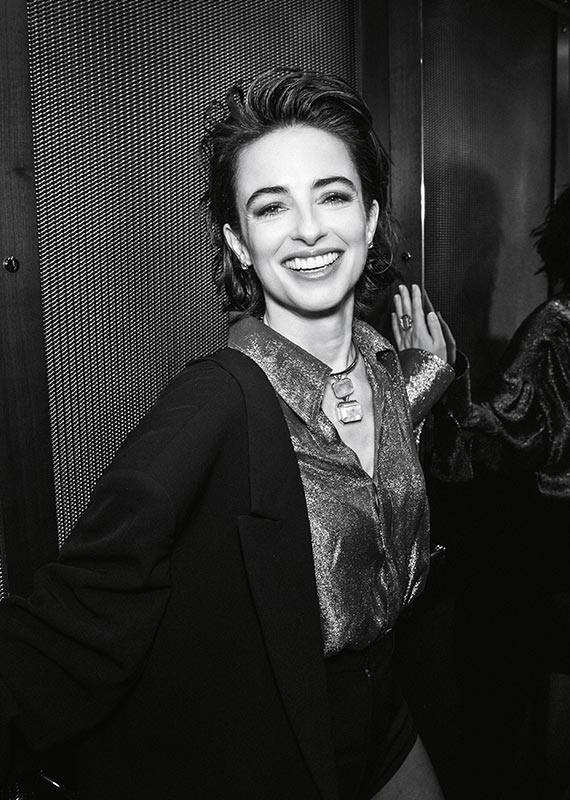 Laura wears: full look by Petar Petrov; tights by Wolford; ring and necklace by Goossens; earrings by Mejuri; and shoes by Giuseppe Zanotti
Laura wears: full look by Petar Petrov; tights by Wolford; ring and necklace by Goossens; earrings by Mejuri; and shoes by Giuseppe Zanotti
Having made her screen debut in Channel 4 teen drama Sugar Rush the next year, Laura went on to appear in TV projects including The Fall, Outlander and The Nevers, while also carving out an impressive career on the stage, where highlights have included The Wasp (Trafalgar Studios), Judgement Day (Almeida Theatre), and A Midsummer Night’s Dream (Regent’s Park Open Air Theatre).
I wonder how she chooses the jobs she’d like to be involved with. “It’s really a simple case of whether the prospect of doing it excites me,” she reveals. “The first thing that I look to is the writing, and how good that is, and whether the character I would be playing feels like it is going to be proper work; like I’m going to have some stuff to explore. That said, sometimes you just really want to work with a particular person. You know, there are many different things that can make that decision, but for me the new is always what’s most exciting. I don’t ever really want to go over old ground; I always want to be discovering something new in myself, and my abilities and my process, and to get to delve into some kind of psychology I’ve never looked at.” It is arguably theatre where Laura has made the biggest mark to date, garnering rave reviews for her various performances. Her role in The Ferryman saw her win an Olivier Award for best actress, and a Tony nomination. She recalls the Olivier Awards ceremony as being a “pretty surreal” experience. “I don’t remember much about the immediate moment,” she laughs.
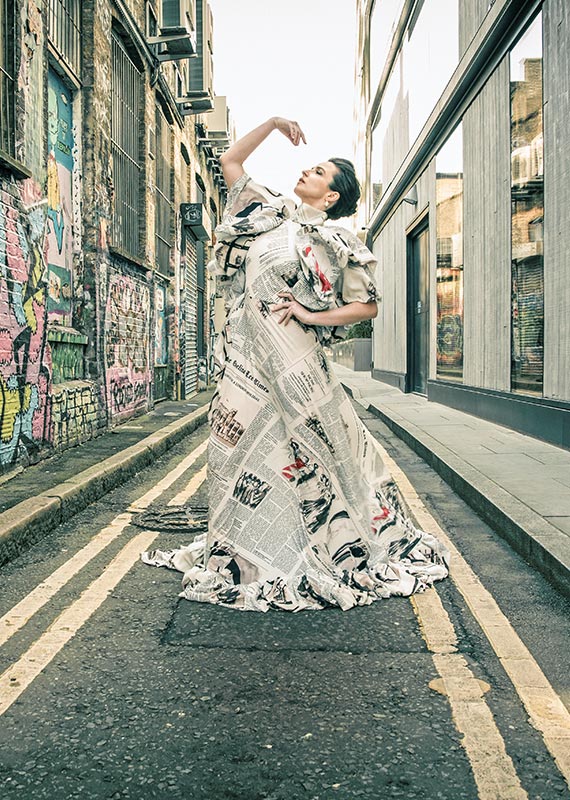 Laura wears: dress by Edeline Lee; and earrings by Eshvi for KOIBIRD
Laura wears: dress by Edeline Lee; and earrings by Eshvi for KOIBIRD
“It’s hugely gratifying to be told by your peers that they value what you do, and that they think that what you do is good. And it was very exciting, and I felt immensely grateful, and I still do, but at the same time it has absolutely no bearing on what comes next, nor should it. I think that it was a really lovely moment in time, it’s something I’m really proud of, but I was proud of the work anyway. And I think that it’s really important to hold onto that, because the work is the thing, and if you can be fulfilled by it, you can be proud of it, then that’s definitely the most lasting element.”
Does she have a preference for stage or screen, or does she see them as entirely different aspects of the job? “I see them as separate and complementary, I suppose,” she says. “Usually, when I finish several months doing a play, I’m really excited about the idea of being on a set and doing screen work again. And certainly, by the time I finish screen work I’m absolutely dying to get on stage again. If I really had to choose, I would absolutely choose theatre. There’s just such a satisfaction in being able to tell a complete story from start to finish and being able to see a character through an arc. And of course, usually the stories and the characters are so much more layered and complex, and there’s so much more to get your teeth into when it comes to theatre. And what I really love about theatre is how deeply you get to experience the story yourself, because the sheer nature of the repetition, the doing it over and over, night after night, means that you get deeper into it, and discover more about it, and it changes all the time. And I just find that to be hugely exciting, and artistically fulfilling. I think there’s something about the ownership of performance in theatre that an actor has over their role, that you don’t necessarily have on screen. Because an editor can change everything about your performance, they can make it loads better, they can make it non-existent… But I do love that about it; it does make the two very different.
Of course, the nature of theatre work means that Laura is currently seeing a lot less of her family at the moment – how does she find a balance? “I don’t love answering that question, because I think people rarely ask men,” she admits. “There are two parents in our household, I rely on their father; we just figure it out… I miss them a lot, and at the moment I’m not seeing a lot of them, but they get it, they’re starting to come to the age where they get it. And you know, I think that so long as they feel secure, and well looked after, then it doesn’t have to be me doing the looking after all the time. And it absolutely makes it more special when I am with them – Sundays are great!”
Whether the next role will allow for a different dynamic remains to be seen. “When I’m doing theatre, I can only ever be entirely in the present moment,” she tells me, when I ask about future plans. “Some part of me is excited about a summer holiday, but I can’t even think about that right now, so I am very much right in the here and now with this play, and there’s a long way to go with it!”
